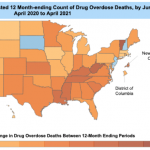By Julene Reese
The Centers for Disease Control released a report this week stating that for the first time, the number of overdose deaths in the United States was over 100,000 in a 12-month period. This is the first analysis since the start of COVID-19 and is for the period ending April 2021. The data marks one year since the nation saw a major disruption of services due to COVID-19 and comes on top of the numerous challenges already faced by many.
Maren Wright Voss, Utah State University Extension assistant professor of health and wellness, said while the nation saw a 29% increase in overdose deaths, Utah’s numbers were not so bleak.
“Gratefully, our state’s overdose rates declined sharply since 2018, but Utah-specific CDC data shows a climb that began March 2020 as COVID hit,” she said. “The Utah overdose death rate is now up 20%. The high was more than 750 deaths in 2016, but then we were down to 550 in 2020, so it’s heartbreaking to see it jump by 100 deaths so dramatically.”
As many have been working to address the COVID-19 health crisis, this new pandemic of loss adds to the burden. Prevention experts suggest the need for redoubled efforts and focus.
“We know from prevention science that resilience is built when there is more connection and support in a community,” Voss said. “We recognize that recovery communities can use more support.”
The White House-endorsed Health and Human Services Overdose Prevention Strategy announced last month includes more focus on primary prevention of substance use disorders as an upstream approach, which would help prevent the problem before it begins. It also includes more support for downstream prevention, like harm reduction, with “robust” support for access to overdose reversal medication like naloxone, medication-based treatment access and recovery supports.
Mary Jo McMillen, executive director of Utah Support Advocates for Recovery Awareness, said the organization recognizes the drug and alcohol addiction epidemic is already exacerbated by isolation.
“The COVID-19 pandemic has further isolated people who struggle with substance use, and now they are at greater risk of dying from opioid/drug overdose and alcoholism,” she said. “We know that people have a greater chance to establish and sustain recovery from addiction when they connect with people and have access to mutual and local support within their community.”
USU’s Health Extension: Advocacy, Research, & Teaching (HEART) Initiative has performed prevention efforts locally since 2018. From prescription take-back day support to Recovery Day events and harm reduction trainings, Extension faculty have worked to share the message of opioid safety.
“As I look at the numbers nationally and in Utah, I can’t help but think that our multi-pronged prevention efforts are working,” Dave Schramm, Extension family life specialist, said. “Our resources are becoming better known and are becoming more readily available, and that ultimately translates into fewer deaths and more people getting the help they need.”
Upcoming prevention events in Utah include community opioid education dinners in Weber, Carbon, and Emery counties in November 2021 and February 2022 as well as a First Responder Opioid Resources Summit in Tooele Dec. 8-9. More information is available at extension.usu.edu/heart/community-education-dinner.



